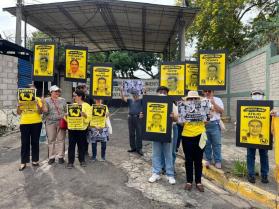Trans Activists Fill the Streets with Color, Music, and Demands for Human Rights
On May 17, 2019, trans activists and their allies took to the streets of San Salvador for the tenth annual March Against Transphobia to demonstrate their rightful and growing presence in Salvadoran society and to demand legislation and other measures to guarantee their civil, political, economic, and human rights. In the words of one organizer: "Today we say enough is enough discrimination, enough marginalization; we are humans with equal rights.”
The LGBTI movement has made several concrete advances in recent decades, including an HIV/AIDS law that guaranteed integrated state care for people living with HIV/AIDS; a measure (known as Decree 56) against public sector discrimination under the Funes administration; creation of the National Sexual Diversity Collective within the FMLN; and state recognition of the LGBTI community in the form of the Directorate for Sexual Diversity (formerly) within the Social Inclusion Secretariat.
Despite these advances, there’s a long way to go. Honduras, El Salvador, and Guatemala are among the most dangerous countries for trans women in the world. Trans people in El Salvador continue to face discrimination, social exclusion, extortion, threats, torture, rape, and death, often at the hands of the police and mostly overlooked by an institutionalized culture of transmisogyny that has proven difficult to uproot. This reality has forced many trans people to seek asylum in the United States, and countless do every year.
Day in and day out, therefore, trans activists in El Salvador continue the struggle to make Salvadoran society a place of safety, opportunity, inclusivity, and equality from which no trans person has to flee. “The constitution says we are all equal under the law, but the reality is, we are not all equal under the law,” said a speaker just before the march left from the center of San Salvador. And the march itself is a colorful, powerful tool in this struggle that the movement uses to present its demands.
A priority among these demands is ratification of the Gender Identity Law. Originally drafted by the Permanent Roundtable for the Gender Identity Law in 2012, backed by the FMLN, and introduced into the legislature in 2018, the Gender Identity Law would allow trans people to legally change their name and sex designation on state-issued IDs and other official state documents from their assigned sex and name at birth to their current names and true gender identity. This law would ensure that trans people can vote, open bank accounts, establish credit, access education and healthcare, and travel—all of which require documentation. "The state recognizes us with a gender that is not the one we recognize for ourselves, which translates into violations of human rights,” said an organizer with ASPIDH-Arcoíris, a trans rights organization based in San Salvador. A glimmer of progress was seen on this issue recently when a family court judge approved the name and gender change on the documentation of a trans woman in southern El Salvador.
Other demands of the movement include eliminating laws and policies that discriminate on the grounds of sexual orientation, identity, and gender expression; reforming the labor code to promote nondiscriminatory minimum hiring of LGBT persons in the private sector; and investigating, prosecuting, and punishing perpetrators of violence against trans people. This last demand was emphasized at the March by bold and colorful signs that read: “ENOUGH WITH IMPUNITY IN THE JUSTICE SYSTEM!” Finally, the movement also demands protection of witnesses of crimes, human rights defenders, and victims who fear reprisal if they testify against perpetrators.
The trans movement in El Salvador is also working to establish and strengthen regional coalitions with movements throughout Latin America. In May, an activist from the National Sexual Diversity Collective within the FMLN represented El Salvador at the IV Conference of LGBTI Political Leaders of the Americas in Bogotá, Colombia. There, LGBTI leaders are able to share struggles, victories, and strategies for promoting political participation and to generate ideas to foster dialogue with state institutions. In the words of the Salvadoran representative to the conference, “Not only is visibility important, but so is real legislative advocacy that is egalitarian and effective. Trans people and trans identities must have direct participation in various spaces—in decision-making, in class struggles and other social movements, in political measures, and in popular election processes.”
This message is in line with grassroots trans and LGBTI movements in El Salvador, which are grounded in intersectional class struggle that work to foreground the social and economic structures that make the LGBTI community vulnerable. Despite ongoing discrimination deeply embedded in El Salvador’s conservative sectors, the LGBTI community continues to fight alongside the working class, sex workers, informal vendors, care/domestic workers, people who are imprisoned, and others marginalized by oppressive systems imposed on the country. “We’re not the problem,” said one speaker at the march, “we’re part of the solution.”
Despite the important advances achieved by the LGBTI movement, major challenges remain. Although newly inaugurated President Nayib Bukele has expressed support for LGBTI rights, he also has said he opposes same-sex marriage, stating that he believes marriage is between a man and a woman. Likewise, days after the inauguration, President Bukele announced the elimination of the Social Inclusion Secretariat, first established under the FMLN, which housed the Directorate for Sexual Diversity; the latter body was moved to the Culture Secretariat, raising questions about the future of the work to advance LGBTI rights at the state level.
On the day of President Bukele’s inauguration, the LGBTI Federation released a statement indicating that they would protect the advances made over the last two terms of FMLN governance. They called on the new administration to “expand inclusive public policies,” to defend and extend the anti-discrimination decree, to “strengthen the alliances that the movement has forged with various government agencies and institutions,” and to select a suitable human rights ombudsman who will “maintain a firm commitment to defend and protect the rights of the LGBTI community in situations of vulnerability, aggression, and violence.”
The trans movement has likewise called upon its allies in the international community to “find ways to become involved in strengthening measures that protect trans people against acts of violence and discrimination based on their sexual orientation, gender identity, or gender expression.” If you’re looking for a place to start, you can follow trans and LGBTI movements such as The Salvadoran LGBTI Federation, COMCAVIS Trans, The National Sexual Diversity Collective, and AMATE El Salvador on social media.

 "I am a CISPES supporter because continuing to fight for social justice and a more people-centered country means continuing the dream and sacrifice of thousands of my fellow Salvadorans who died for that vision.” - Padre Carlos, New York City
"I am a CISPES supporter because continuing to fight for social justice and a more people-centered country means continuing the dream and sacrifice of thousands of my fellow Salvadorans who died for that vision.” - Padre Carlos, New York City

